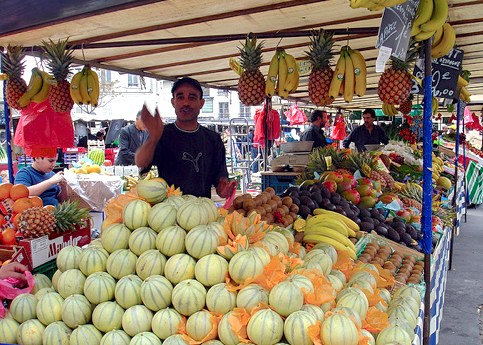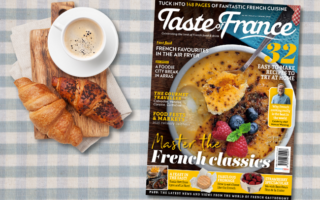French Lesson: Shopping in a French Market
- SUBSCRIBE
- ALREADY SUBSCRIBED?
BECOME A BONJOUR PARIS MEMBER
Gain full access to our collection of over 5,000 articles and bring the City of Light into your life. Just 60 USD per year.
Find out why you should become a member here.
Sign in
Fill in your credentials below.
Your French lesson for shopping in a marché
In French open markets, there is usually a friendly, relaxed and informal ambiance. Les marchands (merchants) often like to joke and have fun with les clients (clients), and it’s not unusual to have them make flirtatious comments, just for fun, or act a bit silly, or to sing out loud: Ils sont beaux mes poulets, qu’ils sont beaux! (My chickens are beautiful, yes they are!).
As a customer, you should be a smart shopper, and always check what the merchant is giving you: are the fruits bien mûrs? (ripe?) and are you sure he didn’t slip a rotten one in the bag. Don’t hesitate to check and hand back a couple of fruits/vegetables you don’t like. Look where the product comes from or you are at risk of buying the same things as in the supermarket!
Don’t hesitate to marchander (barter), why not? It’s common practice, even more so if you are buying something a bit expensive—like a leather bag—or several of a somewhat expensive item, like four barquettes de fraises (four boxes of strawberries). Simply ask: Vous pouvez me faire un petit prix? (Could you give me a small discount?)
In France, you should always say Bonjour Madame, Mademoiselle, Monsieur—it’s much more polite than bonjour alone. Merchants will often use Bonjour, M’sieurs Dames, but it is not the most sophisticated way to speak, so I’d encourage you to not use it.
One last thing, try to take monnaie (small change) with you. Vendors don’t like when you spend five euros and hand them a 20 euro bill and many of them won’t take credit cards.
Here is a typical dialogue in French, with the English translation below:
V: Bonjour ma p’tite dame, qu’est-ce que ce sera aujourd’hui ?
C: Bonjour Monsieur. Est-ce que vous avez un melon bien mûr, c’est pour ce soir.
V: Attendez voir… oui, celui-là est parfait.
C: Alors je vais le prendre.
V: Et avec ceci ?
C: Deux kilos de pommes Braeburn, un kilo de tomates en grappe—elles sont vraiment délicieuses vos tomates !
V: Oui, elles sont bonnes, hein ! Et tout bio ! Il n’y a que du bon là-dedans !
C: Je vais aussi prendre une botte de persil.
V: Voila. Vous voulez un sac ?
C: Non, merci, j’ai mon panier !
V: Alors attention de mettre les tomates au dessus, pour ne pas les écraser.
C: Oui, ça serait dommage. Je vous dois combien ?
V: Sept euros soixante-quinze.
C: Voilà dix euros.
V: Et voici votre monnaie, deux euros vingt-cinq. Bonne journée, Madame.
C: Merci Monsieur, et bonne journée à vous aussi !
English translation:
V: Hello pretty lady, what will it be today?
C: Hello Sir. Would you have a nicely ripe melon? It’s for tonight.
V: Let me see… yes, this one is perfect.
C: So I’ll take it.
V: And what else?
C: Two kilos of Braeburn apples, one kilo of tomatoes on the vine—they really are delicious, your tomatoes!
V: Yes, indeed! And all organic! Only good stuff in there!
C: I will also have a bunch of parsley.
V: Here you go. Would you like a bag?
C: No thanks, I have my basket!
V: Then be careful to put the tomatoes on the top, so you don’t crush them.
C: Yes, that would be too bad. How much do I owe you?
V: Seven euros and seventy-five cents.
C: Here are ten euros.
V: And here is your change: two euros and twenty-five cents. Have a good day, Ma’am.
C: Thank you, sir, and have a good day as well.
Camille Chevalier-Karfis lives in Brittany and she’s been teaching today’s French language to adults around the world for over 19 years with her company, French Today.
Lead photo credit : Friendly fruit vendor at Marché d'Aligre. Photo credit joyousx
More in Cafe, Hotels, Monument, Museum, Neighborhood, Paris, Shopping





REPLY